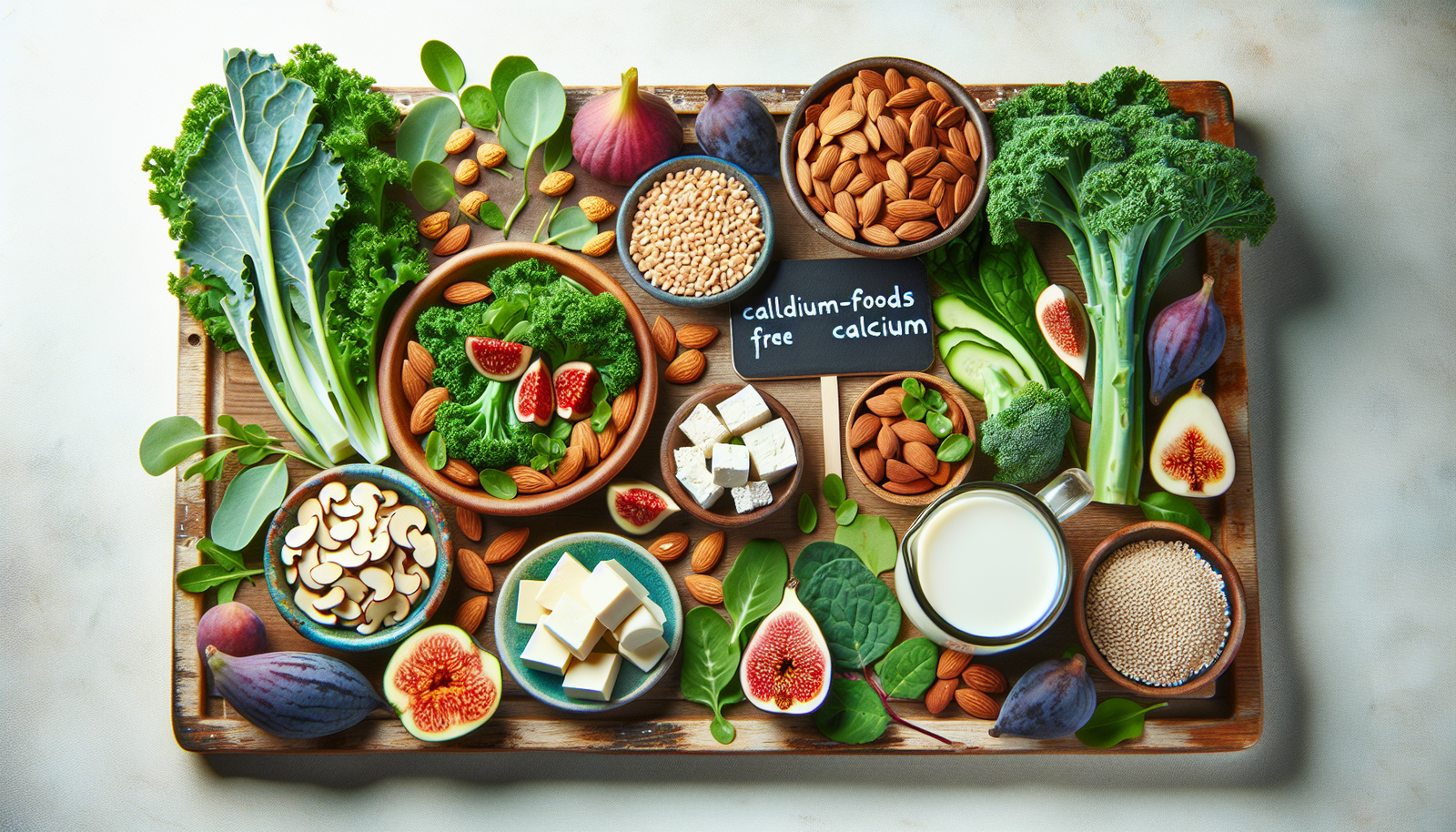
How to Meet Calcium Needs on a Dairy-Free Diet
Meeting calcium needs on a dairy-free diet is crucial for those avoiding dairy yet wanting to maintain strong bones and overall health. While dairy products are a common source of calcium, numerous alternatives exist for those who are lactose intolerant or prefer plant-based diets. For instance, one cup of fortified almond milk can contain as much calcium as cow’s milk. This post will explore various foods and fortified products, such as leafy greens, nuts, seeds, and supplements, to ensure you meet your daily calcium requirements. Embrace these strategies to support bone strength and overall well-being without relying on dairy products.
Understanding Calcium’s Importance in a Dairy-Free Diet
Navigating a dairy-free diet can pose challenges, especially when it comes to meeting calcium needs. Many people associate calcium with dairy, but it plays a crucial role regardless of dietary preferences. Understanding calcium’s vital functions is the first step in ensuring a balanced diet without dairy.
Functions of Calcium in the Body
Calcium is essential for maintaining strong bones and teeth. It’s a cornerstone of skeletal health. But its benefits don’t stop there. Calcium plays a vital role in blood clotting, muscle contraction, and nerve function. It helps regulate the heartbeat and facilitates communication between the brain and other parts of the body.
Calcium also aids in enzyme activity. It supports metabolic processes that turn food into energy and aids cellular functions. In short, calcium is a multitasker, integral to overall health.
Risks of Calcium Deficiency
Calcium deficiency can lead to severe health problems. One of the most common is osteoporosis, a condition where bones become brittle and prone to fractures. A lack of calcium can also cause muscle cramps, spasms, and even abnormal heart rhythms.
Children and teenagers need adequate calcium for growth and development. Deficiency in these years can inhibit bone development, leading to lifelong issues. Adults, particularly postmenopausal women, are at higher risk of osteoporosis without sufficient calcium intake.
Recommended Daily Calcium Intake
Getting the right amount of calcium each day is crucial. For adults, the recommended daily intake is around 1,000 milligrams. This amount varies with age and gender. For example, teenagers and elderly adults may require more. Pregnant and breastfeeding women also have higher needs.
It’s important to consult a healthcare provider to determine the exact amount suitable for individual needs. A balanced approach ensures that the body gets the calcium it needs to function optimally.
Calcium-Rich Dairy-Free Food Sources
Finding calcium-rich foods doesn’t have to be difficult, even on a dairy-free diet. There are a variety of options that can fit into any meal plan. Exploring these alternatives ensures you receive adequate calcium without dairy.
List of Calcium-Fortified Foods
Calcium-fortified foods are an excellent way to enhance calcium intake. Here are some popular options:
- Fortified Plant Milks: Almond, soy, and rice milk are often fortified with calcium.
- Fortified Cereals: Many breakfast cereals provide a calcium boost.
- Fortified Orange Juice: Adds calcium without compromising taste.
- Fortified Tofu: Offers a plant-based protein source with added calcium.
These foods make it easier to meet daily calcium requirements without relying on dairy.
Plant-Based Foods High in Calcium
Nature offers a bounty of plant-based calcium sources. Leafy greens like kale, collard greens, and broccoli are packed with calcium. Nuts and seeds, especially almonds and sesame seeds, also contribute significantly.
Beans and Lentils: High in calcium and fiber, perfect for hearty meals. Chia and Flax Seeds: Easy to add to smoothies or oatmeal for an extra calcium boost. Figs and Oranges: Sweet options that provide a healthy dose of calcium.
Incorporating these foods into your diet can help maintain calcium levels while enjoying a dairy-free lifestyle.
Importance of Varied Food Choices
Diversifying food choices is crucial in a dairy-free diet. It ensures a balance of nutrients and avoids monotony. Relying on a single food source for calcium can lead to nutrient gaps.
Variety introduces different flavors and textures that keep meals interesting. It also provides other essential nutrients that support overall health. Embracing a wide range of foods helps maintain enthusiasm for a dairy-free diet and meets nutritional needs effectively.
Effective Strategies for Meeting Calcium Needs Without Dairy
Ensuring adequate calcium intake on a dairy-free diet requires strategic planning. With the right tactics, it’s possible to meet and even exceed your calcium needs without compromise.
Tips for Ensuring Adequate Calcium Absorption
Calcium absorption is as important as calcium intake. Several factors affect how well the body absorbs calcium:
- Vitamin D: Promotes calcium absorption. Sunlight and fortified foods are great sources.
- Limit Sodium and Caffeine: High amounts can hinder calcium retention.
- Balanced Magnesium Intake: Supports calcium absorption and bone health.
Combining foods rich in these nutrients can enhance calcium uptake. It’s about making conscious choices that support the body’s ability to use the calcium consumed.
Role of Supplements in a Dairy-Free Diet
Supplements can be a helpful addition to a dairy-free diet. They fill the gap when dietary intake falls short. However, it’s essential to use them correctly.
- Consult a Healthcare Professional: Ensure the right type and dosage.
- Choose High-Quality Supplements: Look for options free from unnecessary additives.
- Monitor Calcium Levels: Consider regular checks to adjust supplementation as needed.
Supplements should complement a healthy diet, not replace it. They offer peace of mind but work best alongside calcium-rich foods.
Balanced Meal Planning for Optimal Calcium Intake
Planning meals with calcium in mind ensures you meet daily requirements. Start by incorporating a variety of calcium-rich foods throughout the day.
- Breakfast: Fortified cereal with almond milk.
- Lunch: Kale salad with chickpeas and sesame dressing.
- Dinner: Stir-fried tofu with broccoli.
Snacks like almonds or a fig smoothie can add extra calcium. This approach balances meals, making it easier to achieve optimal calcium intake without dairy. It’s about creating a routine that becomes second nature while enjoying diverse and delicious foods on your dairy-free journey.
Conclusion
A dairy-free diet can still meet calcium requirements through various foods and supplements. Leafy greens like kale and broccoli, along with fortified plant-based milks and juices, provide good sources of calcium. Nuts and seeds, especially almonds and chia seeds, contribute to daily calcium intake. Including tofu, which is often fortified with calcium, is another effective way to ensure adequate calcium levels. Regularly eating calcium-rich foods and monitoring intake helps maintain bone health without relying on dairy products.
FAQ
How can I get enough calcium without consuming dairy products?
Embrace a variety of calcium-rich foods like leafy greens, almonds, and fortified plant milks. These options provide essential nutrients without relying on dairy. Incorporating a range of these foods daily can help maintain adequate calcium levels.
What are the best plant-based sources of calcium for a dairy-free diet?
Leafy greens such as kale and bok choy, almonds, chia seeds, and fortified plant-based milks stand out as top options. Tofu and tempeh also offer significant calcium content, making them ideal for a balanced dairy-free diet.
How much calcium do I need daily if I am following a dairy-free diet?
Adults generally need about 1,000 mg of calcium daily, though this can vary based on age and specific health needs. Checking with a healthcare professional provides guidance tailored to individual requirements.
Are calcium supplements effective for those on a dairy-free diet?
Calcium supplements can support those struggling to meet their daily intake through food alone. Selecting the right type and dosage requires consultation with a healthcare provider to ensure safety and effectiveness.
How can I ensure I’m meeting my calcium needs with a lactose-free diet?
Incorporating a variety of calcium-rich, lactose-free foods, alongside fortified products, ensures sufficient calcium intake. Regular monitoring and dietary adjustments play a crucial role in maintaining bone health.
What are the signs of calcium deficiency in individuals avoiding dairy?
Common signs include muscle cramps, fatigue, and brittle nails. If these symptoms appear, consulting with a healthcare provider is essential to address potential deficiencies early on.











